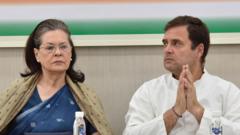This article outlines the complex intersection of politics, media, and legal challenges facing the Congress party, as well as the historical context of the National Herald newspaper as a significant entity shaped by India's struggle for independence.
Gandhis Face Money Laundering Allegations: Congress Plans Nationwide Protests

Gandhis Face Money Laundering Allegations: Congress Plans Nationwide Protests
An escalating political confrontation unfolds in India as the Gandhis are accused of financial misconduct, prompting widespread opposition protests.
The Enforcement Directorate (ED) of India has charged senior Congress leaders Sonia and Rahul Gandhi with money laundering, leading to plans for nationwide protests by the Congress party on Wednesday. The allegations assert that the Gandhis formed a shell company to illicitly acquire assets from the National Herald newspaper valued at over 20 billion rupees (approximately $233 million). Congress spokesperson Jairam Ramesh condemned the charges as "politics of vendetta and intimidation," while the Gandhis maintained silence on the matter. The investigation, initiated in 2021 following a complaint from Bharatiya Janata Party (BJP) member Subramanian Swamy, claims that party funds were misused to take over the now-defunct Associated Journals Limited (AJL) that published the National Herald. The Congress party defends its actions as necessary to protect its historical legacy, having lent over 900 million rupees to AJL over the years. The ED has reportedly placed several properties linked to Young Indian, a company largely controlled by the Gandhis, under scrutiny for undervaluation. The broader implications of these actions suggest potential governmental abuse of power, with increased criticism regarding the use of agencies like the ED to target political adversaries. The case is set for a hearing on April 25, highlighting the ongoing tensions in India's political landscape.


















